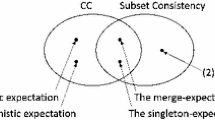Abstract
Externality games are studied in Grafe et al. (1998, Math. Methods Op. Res. 48, 71). We define a generalization of this class of games and show, using the methodology in Izquierdo and Rafels (1996, 2001, Working paper, Univ Barcelona; Games Econ. Behav. 36, 174), some properties of the new class of generalized externality games. They include, among others, the algebraic structure of the game, convexity, and their implications for the study of cooperative solutions. Also the proportional rule is characterized for this class of games.
Similar content being viewed by others
References
Aumann, R. and Maschler, M. (1964), The Bargaining Sets for Cooperative Games. Princeton University Press, Princeton, NJ 443–476.
Chun, Y. (1988), The proportional solution for right problems, Mathematical Social Sciences 15, 231–246.
Driessen, T.S.H. and Tijs, S.H. (1985), The τ-value, the core and semiconvex games, International Journal of Game Theory 15, 229–248.
Grafe, F., Iñarra, E. and Zarzuelo, J.M. (1998), Population monotonic allocation schemes on externality games, Mathematical Methods of Operation Research 48(1), 71–80.
Izquierdo, J.M. and Rafels C. (1996), A generalization of the bankruptcy game: Financial cooperative games.Working Paper. Universidad de Barcelona.
Izquierdo, J.M. and Rafels, C. (2001), Average monotonic cooperative games, Games and Economic Behavior 36, 174–192.
Mas-Colell, A. (1989), An equivalence theorem for bargaining sets, Journal of Mathematical Economics 18, 129–139.
Littlechild, S.C. and Thomson, G.F. (1977), Aircraft landing fees: a game theory approach, The Bell Journal of Economics 8, 186–204.
Moulin, H. (1992), All sorry to disagree: a general principle for the provision of nonrival goods, Scandinavian Journal of Economics 94(1), 37–51.
O'Neill, B. (1982), A problem of rights arbitration from the Talmud, Mathematical Social Sciences 2, 345–371.
Shubik, M. (1984), A Game-Theoretic Approach to Political Economy. The MIT Press, Cambridge, MA.
Thomson, W. (1995), Bankruptcy and taxation problems: an axiomatic analysis. University of Rochester Working Paper. Forthcoming in Mathematical Social Sciences.
Thomson, W. (2002), Axiomatic and Game-Theoretic Analysis of Bankruptcy and Taxation Problems: A Survey. mimeo University of Rochester.
Tijs, S.H. (1981), Bounds for the core and the τ-value, in: Moeschin, O. and Pallasche, D. (eds.), Game Theory and Mathematical Economics, North Holland, pp. 123–132.
Author information
Authors and Affiliations
Rights and permissions
About this article
Cite this article
Corcho, P., Ferreira, J.L. Generalized externality games. Theory and Decision 54, 163–184 (2003). https://doi.org/10.1023/A:1026256800461
Issue Date:
DOI: https://doi.org/10.1023/A:1026256800461




